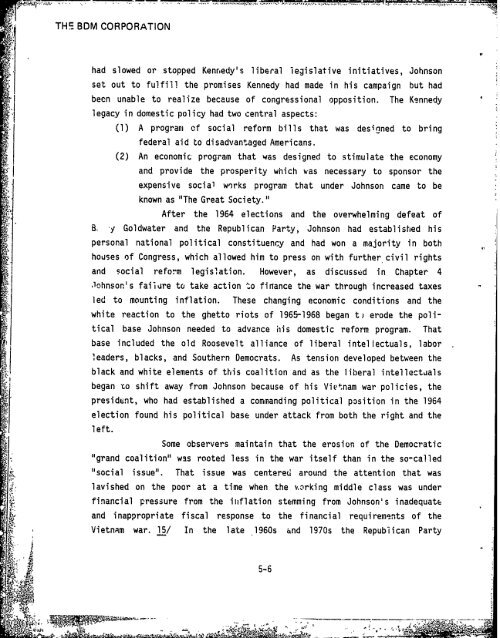policy - The Black Vault
policy - The Black Vault
policy - The Black Vault
You also want an ePaper? Increase the reach of your titles
YUMPU automatically turns print PDFs into web optimized ePapers that Google loves.
THE BDM CORPORATION<br />
i<br />
had slowed or stopped Kennedy's liberal iegislative initiatives, Johnson<br />
set out to fulfill the promises Kennedy had made in his campaign but had<br />
been unable to realize because of congressional opposition. <strong>The</strong> Kennedy<br />
legacy in domestic <strong>policy</strong> had two central aspects:<br />
(1) A program of social reform bills that was designed to bring<br />
federal aid to disadvantaged Americans.<br />
(2) An economic program that was designed to stimulate the economy<br />
and provide the prosperity which was necessary to sponsor the<br />
expensive social works program that under Johnson came to be<br />
known as "<strong>The</strong> Great Society."<br />
After the 1964 elections and the overwhelming defeat of<br />
B. y Goldwater and the Republican Party, Johnson had established his<br />
personal national political constituency and had won<br />
a majority in both<br />
houses of Congress, which allowed him to press on with further civil rights<br />
and social reform legislation. However, as discussed in Chapter 4<br />
.Johnson's failure to take action to finance the war through increased taxes<br />
led to mounting inflation. <strong>The</strong>se changing economic conditions and the<br />
white reaction to the ghetto riots of 1965-1968 began t) erode the political<br />
base Johnson needed to advance his domestic reform program.<br />
base included the old Roosevelt alliance of liberal intellectuals, labor<br />
leaders, blacks, and Southern Democrats. As tension developed between the<br />
black and white elements of this coalition and as the liberal intellectuals<br />
began to shift away from Johnson because of his Vietnam war policies, the<br />
president, who had established a commanding political position in the 1964<br />
election found his political base under attack from both the right and the<br />
left.<br />
That<br />
Some observers maintain that the erosion of the Democratic<br />
grand coalition" was rooted less in the war itself than in the so-called<br />
"social issue". That issue was centere6 around the attention that was<br />
lavished on the poor at a time when the v, rking middle class was under<br />
financial pressure from the inflation stemming from Johnson's inadequate<br />
and inappropriate fiscal response to the financial requirements of the<br />
Vietnam war. 15/ In the late 1960s and 1970s the Republican Party<br />
AR, 5-6<br />
NOWWWO..<br />
IA .g<br />
M
















